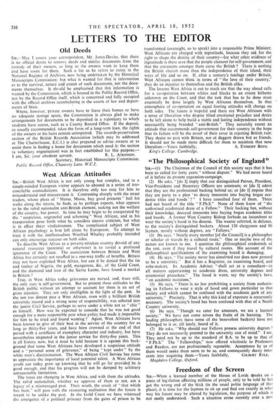West African Attitudes
SIR,—British West Africa is not only young but complex, and to a simple-minded European visitor appears to abound in a series of irre- concilable contradictions. It is therefore only too easy for him to misunderstand and misrepresent it. Contrasting sharply with the street traders, whose pleas of "Massa, Massa, buy good presents" hail his walks along the streets, he finds, as he perhaps expects, what appears to be the rabid nationalist anti-British element, seeking not the welfare of the country, but power. In time he may begin to be exasperated by the "suspicious, ungrateful and scheming" West African, and in his exasperation pour forth what he considers sincere criticism, but what is in effect sheer vindictiveness. The complicated subject of West African psychology is best left alone by Europeans. To attempt to treat it with the intellectualism Winifred Whalley probably intended can only encourage rancour on both sides.
To describe West Africa as a poverty-stricken country devoid of any natural resources (potential or otherwise) is to reveal a profound ignorance of the Coast. The association between Britain and West Africa has certainly not resulted in a one-way traffic of benefits. Britain may not have exploited West Africa, but can it be denied that the tin and timber of Nigeria, the gold, manganese, &c., of the Gold Coast, and the diamond and iron of the Sierra Leone, have found a market in Britain ?
True, in West Africa today grievances are nursed, and, truer still, the only cure is self-government. But to present these attitudes to the British public without an attempt to account for them is an act of gross injustice. They are only intelligible in the light of the past. In the not too distant past a West African, even with a brilliant British university record and a strong sense of responsibility, was ushered into the junior Civil Service, perhaps to serve under a white not as " chic " as himself. How was he expected to concede that he was not ,good enough for a more responsible post when policy had made it impossible for him to be tried and found wanting ? Again, West Africans have been known to give of their best in the service of the country for as long as thirty-five years, and have been crowned at the end of that period with a certificate of exemplary character and industry, but have nevertheless stagnated in the junior service for thirty-five years. This is all history now, but it must be told because it is against this back- ground that some West Africans have developed a suspicious attitude and a personal sense of grievance," of being "kept under" by the white man's discrimination. The West African Civil Service has come to appreciate the importance of local potential talent. A West African youth can today grow up knowing that he will go far provided he is good enough, and that his progress will not be damped by arbitrary unreasonable limitations.
The times are changing in West Africa, and with them the attitudes. The rabid nationalists, whether we approve of them or not, are a legacy of a mismanaged past. Their wrath, the result of "that which has been," will pass with the reassuring realisation that the future is meant to be unlike the past. In the Gold Coast we have witnessed the emergence of a political prisoner from the gates of prison to be transformed (overnight, so to speak) into a responsible Prime Minister. West Africans are charged with ingratitude, because they ask for the right to shape the destiny of their country—for what other evidence of ingratitude is there save that the people clamour for self-government, and that the extremists amongst them curse the British ? There is nothing the British cherish more than the independence of their island, their ways of life and so on. If, after a century's tutelage under Britain, West Africans cannot think in terms of "the love of their country," they do an injustice to themselves and the British alike.
The lessons West Africa is out to teach are that the way ahead calls for a co-operation between whites and blacks to an extent hitherto unknown on the Coast, and that the task that has to be done must essentially be done largely by West Africans themselves. In that atmosphere of co-operation on equal footing attitudes will change on both sides. The future is hopeful and there are West Africans with a sense of liberalism who despise blind emotional prejudice and desire to be left alone to help build a stable and lasting independence without necessarilly being branded "anti-British." They naturally resent an attitude that recommends self-government for their country in the hope that its failure will be the proof of their error in rejecting British rule: They desire to part with Britain, not at daggers drawn but as friends. It should not be made more difficult for them to maintain that sane


































 Previous page
Previous page